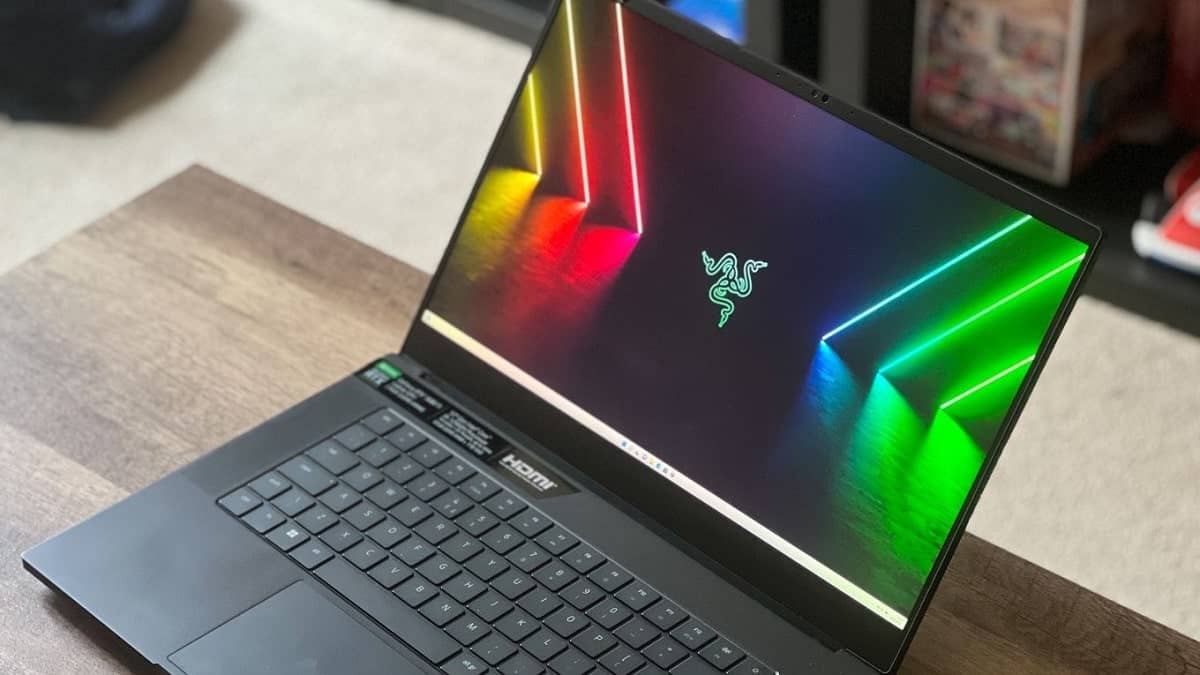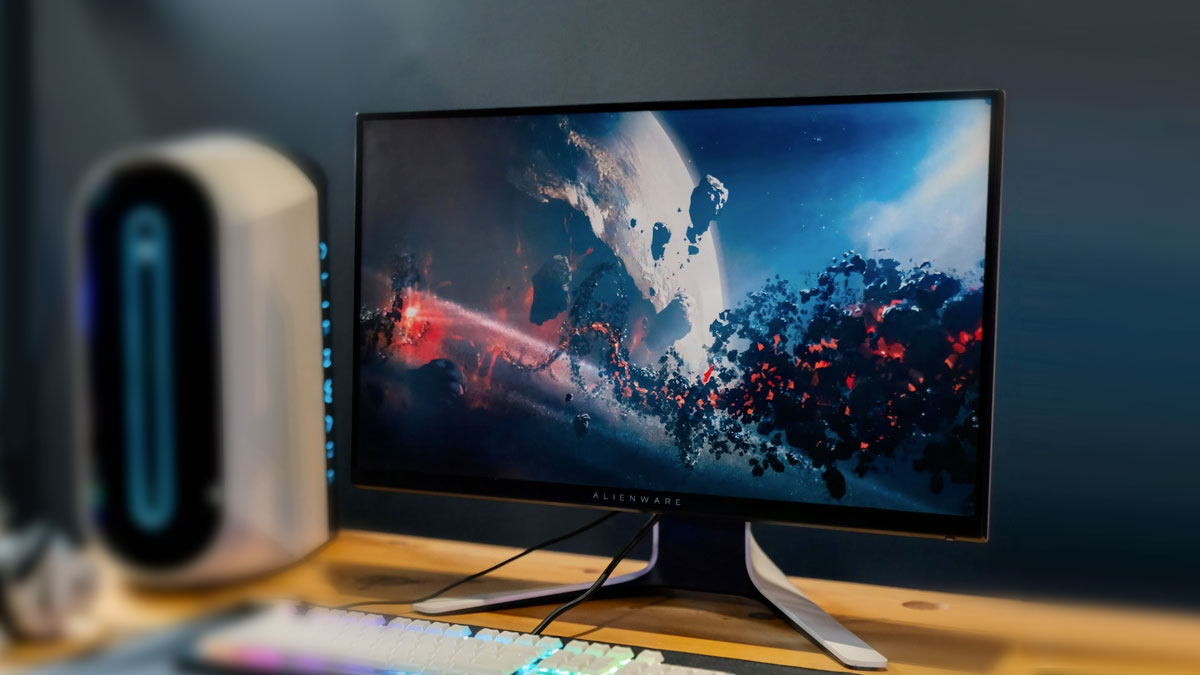Introduction
In today’s gaming world, technology is constantly advancing, pushing the boundaries of what we thought was possible. One of the most significant developments in recent years is the rise of 4K gaming. With four times the resolution of standard high definition, 4K gaming offers incredibly detailed and immersive graphics that can take your gaming experience to the next level.
However, when it comes to gaming laptops, the relevance of 4K resolution is a subject of debate. While it may seem like a no-brainer to have a 4K display on a gaming laptop, there are several factors to consider that make it less of a priority. In this article, we will explore why 4K may not matter as much for gaming laptops as it does for other devices.
Before we delve into the limitations of 4K gaming laptops, let’s first understand what exactly 4K resolution is. Also known as Ultra HD or UHD, 4K refers to a display resolution of 3840 x 2160 pixels, providing exceptional clarity and detail on the screen. This higher resolution means sharper images, crisper textures, and more immersive visuals compared to lower resolution displays.
Now that we have a basic understanding of 4K, let’s take a closer look at the advantages it brings to gaming.
What is 4K?
In the world of technology, resolution refers to the number of pixels displayed on a screen. The term “4K” refers to a display resolution that is four times higher than standard high definition (HD), which is typically referred to as 1080p. A 4K display has a resolution of 3840 x 2160 pixels, providing a total of 8.3 million pixels on the screen.
What sets 4K apart from lower resolution displays is the level of detail it can deliver. With four times the number of pixels, 4K displays allow for more intricate and lifelike visuals. It offers a higher pixel density, resulting in sharper images, finer textures, and more vibrant colors. Whether you’re gaming, streaming movies, or editing photos and videos, 4K resolution can provide a truly immersive and visually stunning experience.
Another advantage of 4K is its ability to display more content on the screen simultaneously. With the increased pixel count, you can fit more windows, applications, or browser tabs on the screen without sacrificing clarity. This can be particularly beneficial for productivity tasks or multitasking.
It’s important to note that to fully experience the benefits of 4K, your content needs to be in 4K as well. This means that games, videos, and other media should be created or optimized for 4K resolution to fully take advantage of the increased level of detail. Additionally, you’ll need a compatible device capable of displaying 4K content, such as a 4K gaming laptop.
Overall, 4K resolution offers a significant leap in visual quality, bringing a new level of realism and immersion to gaming and entertainment. However, when it comes to gaming laptops, there are certain limitations that make the relevance of 4K resolution less crucial. In the following sections, we will explore these limitations in more detail.
The Advantages of 4K Gaming
While there are limitations to consider, there are undeniable advantages to 4K gaming that make it an appealing option for many gamers. Here are some of the key advantages:
- Improved Visual Quality: The most obvious advantage of 4K gaming is the stunning visual quality it offers. With four times the resolution of standard HD, 4K displays provide sharper images, more realistic textures, and more vibrant colors. You’ll be able to see every detail in your games, from the intricacies of the environment to the fine nuances of character models.
- Enhanced Immersion: The high level of detail and clarity offered by 4K resolution can greatly enhance the immersion factor in gaming. Whether you’re exploring vast open worlds, engaging in intense firefights, or experiencing breathtaking cinematics, 4K visuals can draw you deeper into the virtual world and make the gaming experience more exciting and engaging.
- Increased Screen Real Estate: With a higher resolution display, you’ll have more screen real estate to work with. This can be particularly beneficial for games that feature complex user interfaces, allowing you to see more information and have better control over your gaming experience. Additionally, it can enhance productivity when using the gaming laptop for other tasks like content creation or multitasking.
- Future-Proofing: Investing in a 4K gaming laptop can be seen as future-proofing your gaming setup. As more games and media are optimized for 4K resolution, having a 4K display ensures compatibility and a superior visual experience. By getting ahead of the curve now, you’ll be ready to fully enjoy the latest gaming content without the need for immediate upgrades.
These advantages make 4K gaming a highly appealing prospect. However, it is important to carefully consider the limitations and practicality of 4K gaming laptops before making a purchasing decision, which will be discussed in the following sections.
The Limitations of 4K Gaming Laptops
While 4K gaming offers impressive visuals and immersion, there are several limitations to consider when it comes to gaming laptops. Here are some key limitations of 4K gaming laptops:
- Performance Demands: Running games at 4K resolution requires a significant amount of processing power and graphics capabilities. Gaming laptops may struggle to achieve smooth and consistent frame rates at 4K, especially when running graphically intensive games. This can result in lower overall performance and potentially impact the gaming experience.
- Limited Upgrade Options: Unlike desktop PCs, gaming laptops have limited upgrade options. While it may be possible to upgrade certain components like RAM or storage, upgrading the graphics card, which is crucial for 4K gaming, is often not feasible. This means that your gaming laptop may quickly become outdated as newer and more demanding games are released.
- Cost: 4K gaming laptops tend to come with a higher price tag compared to laptops with lower resolution displays. The higher cost is mainly due to the higher-end hardware required to deliver smooth gameplay at 4K resolution. If budget is a concern, investing in a gaming laptop with a lower resolution display may be a more practical option.
- Battery Life: 4K gaming laptops typically consume more power due to the higher resolution and increased processing demands. This can result in reduced battery life, limiting the amount of time you can game on the go without being connected to a power source. If portability and long battery life are important to you, a gaming laptop with a lower resolution display may be a better choice.
- Display Size: The benefits of 4K resolution are more noticeable on larger displays. On smaller gaming laptop screens, the difference in visual quality between 4K and a lower resolution, such as 1440p or 1080p, may not be as significant. Considering the size and portability of gaming laptops, the impact of 4K resolution may not be fully realized.
These limitations highlight the trade-offs that come with 4K gaming on a laptop. While the advantages of 4K resolution are appealing, it is important to consider the practicality and potential drawbacks before deciding whether a 4K gaming laptop is the right choice for you.
Performance Demands
One of the primary limitations of 4K gaming on laptops is the significant performance demands it places on the hardware. Running games at 4K resolution requires a substantial amount of processing power and graphics capabilities. While gaming laptops have come a long way in terms of performance, achieving smooth and consistent frame rates at 4K can be challenging.
Graphically intensive games push the limits of the hardware, and gaming laptops may struggle to keep up when rendering games at 4K resolution. Higher resolutions require more powerful graphics processing units (GPUs) to handle the increased number of pixels. The strain on the GPU can result in lower overall performance, including reduced frame rates and potential lag or stuttering during gameplay.
Moreover, the demanding nature of 4K gaming may require sacrificing other graphical settings like texture quality, shadows, or anti-aliasing to maintain a playable frame rate. This compromise can detract from the visual experience, potentially undermining the benefits of 4K resolution.
It is worth noting that not all games will run equally well at 4K resolution, even on high-end gaming laptops. Some games may require hardware upgrades or optimization to achieve desired performance levels. Considering the rapid advancements in game graphics and the increasing demand for more realistic visuals, gaming laptops may struggle to keep up with the ever-increasing performance demands of 4K gaming.
Therefore, if achieving the highest frame rates and the smoothest gameplay experience is your priority, opting for a lower resolution display, such as 1440p or 1080p, might be a more practical choice. It allows the laptop’s hardware to handle games more efficiently and maintain a better balance between performance and visual quality.
Limited Upgrade Options
When it comes to gaming laptops, one of the notable limitations of 4K gaming is the limited upgrade options available. Unlike desktop PCs, which offer the flexibility to upgrade various components, gaming laptops are often more restricted in terms of upgradability.
While it may be possible to upgrade certain components like RAM or storage, upgrading the graphics card—the most crucial component for 4K gaming—is often not feasible. Most gaming laptops have a dedicated graphics card that is integrated into the motherboard, making it difficult or impossible to replace. This means that the graphics card you choose when purchasing the laptop will likely be the one you’re stuck with throughout its lifespan.
As technology advances and new, more demanding games are released, the graphics card that was once capable of running games at 4K resolution may become outdated. With limited upgrade options, you’ll be left with a gaming laptop that struggles to meet the performance requirements of new games, ultimately limiting your gaming experience.
Additionally, the limited upgrade options of gaming laptops make it challenging to keep up with future advancements in display technology. While 4K resolution is currently the standard for high-end displays, there may be new resolutions or technologies on the horizon that offer even more impressive visuals. Without the ability to upgrade the display itself, your gaming laptop may become outdated in terms of the latest display innovations.
Considering the limitations in upgrade options, it’s important to carefully consider your future gaming needs and the lifespan of your gaming laptop. If you anticipate wanting to play the latest and most demanding games or keeping up with advancements in display technology, a gaming desktop with more upgrade flexibility might be a wiser choice.
Cost
When it comes to 4K gaming laptops, cost is a significant consideration. While the benefits of 4K resolution are appealing, they often come with a higher price tag compared to gaming laptops with lower resolution displays.
The higher cost of 4K gaming laptops is mainly due to the hardware required to deliver smooth and consistent gameplay at 4K resolution. The components, such as the graphics card, need to be more powerful and capable of handling the increased processing demands and rendering higher pixel densities. These high-end components often come at a premium price.
Furthermore, 4K displays themselves typically cost more than lower resolution options. The higher resolution panels, coupled with the requirements for better color accuracy and wider viewing angles, contribute to the increased price of 4K displays. This cost is then transferred to the consumer when purchasing a 4K gaming laptop.
In addition to the higher upfront cost, there may be additional expenses to consider. For example, if you want to fully enjoy the benefits of 4K gaming, you may need to invest in other peripherals or accessories, such as a high-quality gaming mouse, keyboard, or headphones, to complement your gaming experience. These costs can add up quickly.
It is essential to assess your budget and consider whether the added expense of a 4K gaming laptop is justified for your gaming needs. If you are on a tight budget, spending the extra money on a 4K display might not be the best allocation of your resources, especially if it means compromising on other important features or components.
Remember that gaming laptops with lower resolution displays, such as 1440p or 1080p, still offer excellent visual quality and gaming performance at a more affordable price point. It’s crucial to find the right balance between cost and the desired gaming experience.
Battery Life
Battery life is a critical consideration for gaming laptops, especially for those who value portability and gaming on the go. When it comes to 4K gaming laptops, the higher resolution can have a significant impact on battery life.
Running games at 4K resolution requires more processing power and graphics capabilities, which in turn consumes more power. The higher pixel count on the display necessitates the graphics card and other components to work harder, resulting in increased power draw and reduced battery longevity.
While gaming laptops are designed to handle demanding tasks, the power-hungry nature of 4K gaming can drain the battery quickly. This means that you may have a limited amount of time to game without being connected to a power source. The shorter battery life can be a significant disadvantage, especially when traveling or in situations where access to a power outlet is limited.
It’s essential to consider your gaming habits and the intended use of the laptop. If you plan to primarily game while plugged in or have easy access to power, then the impact on battery life may be less of a concern. However, if you value long-lasting battery performance for extended gaming sessions on the go, a lower resolution display might be a more suitable choice.
Ultimately, the decision between a 4K gaming laptop and one with a lower resolution display depends on your priorities and needs. If battery life is a top consideration, it may be more practical to opt for a gaming laptop with a lower resolution that offers longer-lasting battery performance.
Display Size
When it comes to gaming laptops, display size plays a crucial role in the overall gaming experience. While 4K resolution can offer exceptional visuals, the benefits may not be fully realized on smaller laptop screens.
4K resolution shines on larger displays, where the increased pixel density translates to sharper images and more intricate details. However, gaming laptops typically have smaller screens compared to desktop monitors, with screen sizes ranging from 15 to 17 inches on average.
On these smaller screens, the difference in visual quality between 4K and a lower resolution, such as 1440p or 1080p, may not be as noticeable. The increased pixel density of 4K resolution may not be as impactful due to the physical limitations of the display size, leading to diminishing returns in terms of visual fidelity.
Moreover, the smaller screen size of gaming laptops can be a factor when it comes to the practicality of 4K gaming. 4K resolution requires substantial processing power and graphics capabilities to deliver smooth gameplay. Achieving high frame rates and optimal performance at 4K on a smaller screen can be particularly challenging, potentially resulting in lower overall gaming performance.
It’s important to consider your preferences and the purpose of the gaming laptop. If portability and a compact form factor are essential to you, opting for a lower resolution display can still provide an excellent gaming experience while maintaining a more manageable size and weight.
However, if you prefer a larger display size and are willing to sacrifice some portability, then a gaming laptop with a larger screen size and 4K resolution may be worth considering. The larger screen will allow you to fully appreciate the benefits of 4K visuals, especially in games with detailed environments and intricate graphics.
Ultimately, the choice between display size and resolution depends on your personal preferences and priorities. Consider the practicality and importance of screen size, keeping in mind that 4K resolution may have a greater impact on larger displays.
Conclusion
While 4K gaming may seem like the ultimate visual experience, it is important to carefully consider the limitations and practicality of 4K gaming laptops. While 4K resolution offers stunning visuals and enhanced immersion, there are several factors to keep in mind.
Performance demands are a primary consideration, as achieving smooth gameplay at 4K resolution puts a significant strain on the hardware of gaming laptops. Limited upgrade options further challenge the long-term viability of 4K gaming laptops, as components such as the graphics card may not be replaceable or upgradeable. The higher cost of 4K gaming laptops, both in terms of the initial investment and potential peripheral expenses, is another important aspect to consider.
Battery life is a crucial concern, especially for those who desire portability and gaming on the go. The power-hungry nature of 4K gaming can quickly drain a laptop’s battery, limiting the time available for gaming without a power source. Additionally, the impact of 4K resolution may not be fully realized on smaller screens, as the increased pixel density may be less noticeable.
Ultimately, the decision to invest in a 4K gaming laptop depends on your priorities and needs. If you prioritize ultimate visual quality and immersion, have a budget that can accommodate the higher cost, and do not mind potential limitations in performance, upgrade options, and battery life, then a 4K gaming laptop may be the right choice for you.
However, if you prioritize factors such as performance, upgradeability, cost, battery life, or screen size practicality, a gaming laptop with a lower resolution display, such as 1440p or 1080p, may provide a more balanced and suitable gaming experience.
Consider your own gaming preferences, priorities, and budget to make an informed decision that aligns with your needs. Whether you choose 4K or a lower resolution display, the most important aspect is to enjoy your gaming experience to the fullest.

























